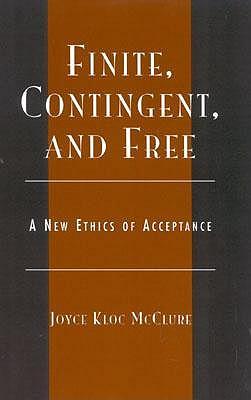Overview
What is it that makes us human, yet makes each of us different? Joyce Kloc McClure offers three defining features: we are all finite (limited), contingent (dependent) and free. McClure explains that finitude and contingency are common to all humans, but are also the two characteristics that create differences among us. Freedom is a result of our particularity - we make ethical decisions based on our own distinct natures. This is a Roman Catholic perspective on ethics written for everyone, not just Roman Catholics. McClure develops an ethical framework for the finite, contingent and free human being. We begin with self-acceptance - understanding that our reactions to finitude and contingency contribute heavily to who we are. McClure says we then extend that same acceptance to others, making acceptance the proper response to the conditions of human existence and the foundation for ethics.
Full Product Details
Author: Joyce Kloc McClure
Publisher: Bloomsbury Publishing Plc
Imprint: Rowman & Littlefield Publishers
Dimensions:
Width: 15.40cm
, Height: 1.50cm
, Length: 23.60cm
Weight: 0.336kg
ISBN: 9780742514041
ISBN 10: 0742514048
Pages: 176
Publication Date: 07 May 2003
Audience:
College/higher education
,
Professional and scholarly
,
Undergraduate
,
Postgraduate, Research & Scholarly
Format: Hardback
Publisher's Status: Active
Availability: In Print

This item will be ordered in for you from one of our suppliers. Upon receipt, we will promptly dispatch it out to you. For in store availability, please contact us.
Reviews
Joyce Kloc McClure here offers us an important and deceptively sophisticated meditation on some of the key conditions for the possibility of moral existence in our time. -- John R. Berkman, Catholic University of America Joyce Kloc McClure offers a serious and systematic study of contingency and limitation not as obstacles to human freedom but precisely as the context for free human action. . This outstanding book deserves the full attention not only of students of Christian ethics but of all who are concerned about the possibility of authentic moral action. -- Brian Linnane, S.J., College of the Holy Cross This important study explores the continuing legacy of ?mechanistic reductionism? in theology and ethics and shows how non-Newtonian science opens the door to a plausible account of humans as finite, contingent, and free. McClure?s efforts to root ethical obligation in an account of the structure of existence in which humans are profoundly but not completely vulnerable is a significant contribution to the field... -- Paul Lauritzen, John Carroll University In an important work for an anxious age, Joyce Kloc McClure offers an elegant and insightful reflection on our 'profound vulnerability to the conditions of existence.' Anyone struggling with the moral implications of contingency and finitude will find a helpful resource in her carefully developed notion of 'freedom as acceptance.' -- Christopher Steck, S.J., Georgetown University This important study explores the continuing legacy of mechanistic reductionism in theology and ethics and shows how non-Newtonian science opens the door to a plausible account of humans as finite, contingent, and free. McClure's efforts to root ethical obligation in an account of the structure of existence in which humans are profoundly but not completely vulnerable is a significant contribution to the field. -- Paul Lauritzen, John Carroll University
Joyce Kloc McClure here offers us an important and deceptively sophisticated meditation on some of the key conditions for the possibility of moral existence in our time. -- John R. Berkman, Catholic University of America Joyce Kloc McClure offers a serious and systematic study of contingency and limitation not as obstacles to human freedom but precisely as the context for free human action. . This outstanding book deserves the full attention not only of students of Christian ethics but of all who are concerned about the possibility of authentic moral action. -- Brian Linnane, S.J., College of the Holy Cross This important study explores the continuing legacy of ?mechanistic reductionism? in theology and ethics and shows how non-Newtonian science opens the door to a plausible account of humans as finite, contingent, and free. McClure?s efforts to root ethical obligation in an account of the structure of existence in which humans are profoundly but not completely vulnerable is a significant contribution to the field... -- Paul Lauritzen, John Carroll University In an important work for an anxious age, Joyce Kloc McClure offers an elegant and insightful reflection on our 'profound vulnerability to the conditions of existence.' Anyone struggling with the moral implications of contingency and finitude will find a helpful resource in her carefully developed notion of 'freedom as acceptance.' -- Christopher Steck S.J., Georgetown University This important study explores the continuing legacy of mechanistic reductionism in theology and ethics and shows how non-Newtonian science opens the door to a plausible account of humans as finite, contingent, and free. McClure's efforts to root ethical obligation in an account of the structure of existence in which humans are profoundly but not completely vulnerable is a significant contribution to the field. -- Paul Lauritzen, John Carroll University
Author Information
Joyce Kloc McClure is assistant professor of religion at Oberlin College.



